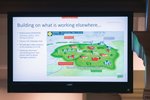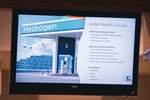




On first glance, Lewis County and the northern Netherlands may not have much in common, but the newly-formed Lewis County Energy Innovation Coalition sees the potential for Lewis County to follow in the footsteps of a Dutch sustainable energy initiative to become the first hydrogen valley in the Pacific Northwest.
“What’s really interesting about hydrogen for us is you need two things for hydrogen: you need water and electricity, and we happen to have both of those … so you can actually do a distributive network of systems to deliver hydrogen in a micro level all over the county,” said Richard DeBolt, executive director of the Lewis Economic Development Council, during a presentation to the Chehalis City Council alongside Kelly Johnston of Clarity Consulting.
DeBolt and Johnston were both members of the initial five-person planning team that got together seven months ago as part of a grant project associated with the hydrogen fuel station planned for a property off of Exit 74. The goal of the grant project was to bring together stakeholders to develop and test a concept around a clean energy economic development strategy in Lewis County, with a focus on transit.
Members of the planning team have been presenting at various local meetings, including the Chehalis and Centralia city councils.
“One of the things that happened when there was initial work around hydrogen and the hydrogen fuel cell charging station was we began to recognize how many ad hoc projects there are in Lewis County relating to clean energy,” said Johnston. “This is really building on the legacy that we have here around natural resources and energy. We’re an energy county. So there’s an opportunity, we think, to bring together these ad hoc activities into a coalition.”
The team discussed multiple energy options, but landed on hydrogen fuel generation as a good choice for an initial project due to its potential as an emerging market for future economic growth.
“Hydrogen works. It’s been a fuel that’s been used for 100 years,” said DeBolt. “The thing is, it got a bad rap. It's had some issues, but it's changed. The technology has changed and the availability has changed.”
The hydrogen fueling station planned for property off of Exit 74 is intended to be a major stop on the country’s hydrogen highway network. The station is anticipated to open as early as 2022 and function with fuel transported from Douglas County until Lewis County can establish its own local hydrogen electrolyzer.
Beyond just looking into a way to manufacture hydrogen for the fueling station, the coalition is looking for ways to integrate hydrogen projects into Lewis County’s economy to expand employment opportunities, increase income levels and decrease pollution.
“I think this is really going to make a difference for our community,” said Johnston, adding that the hydrogen market has the potential to create a wide variety of jobs both for highly-educated and vocational workers.
“There’s a lot of opportunity for our youth to find a really good job that fits their needs here in Lewis County and prevents what I call ‘the brain drain’ which is a lot of our kids are growing up and leaving. We want to give them a reason to come back.”
The Netherlands houses an example of a community that is well on its way to achieving a hydrogen-based economy through an initiative called HEAVENN, an acronym for Hydrogen Energy Applications in Valley Environments for Northern Netherlands, with the goal of establishing a complete hydrogen supply chain within the region.
HEAVENN is one of 36 hydrogen valleys worldwide, only two of which are located in the U.S.
“For me, what that means is that we’re on the leading edge not the bleeding edge. This is out there, it’s being established, there is somewhat of a path to follow, though we would be the first in the northwest, one of the first in the nation, which gives us a leg up in federal and state grants as well as the emerging market, so we can be one of the first to arrive and benefit from it,” Johnston said.
Another benefit of becoming a hydrogen-based economy is that it holds the potential for Lewis County to establish its own local, independent micro-grid.
“As we saw in Texas last winter, opportunities to generate and have your own energy here locally I think are going to be increasingly beneficial,” said Johnston.
The coalition is in the early stages of project planning and intends to begin securing funding for local projects starting in April 2022.
But project development is only one aspect of the coalition’s approach to a clean energy strategy for Lewis County.
The coalition also intends to establish an energy innovation center: a fully staffed, physical facility intended to attract research and development to Lewis County.
“That will be a place where, if a business wanted to come and locate here or do a project here, they would have resources for how do I find grant funding, how do I work with varying levels of state and local government or federal government, how do I find out what else is happening in this community, how do I get permitting done. All those things would happen through that staff center,” Johnston said.
The coalition intends to establish that facility in the fourth quarter of 2022.
The coalition itself is seeking members from both the public and the private sector with the intention of meeting quarterly so its members can stay up to date on ad hoc projects within the community.
“We’re not asking for money. The money for this is in grants from industrial and manufacturers and the private sector and the public sector and the feds. We just need partners to be supportive of the projects,” said DeBolt.
More information on the coalition can be found online at innovatingcleanenergy.com.